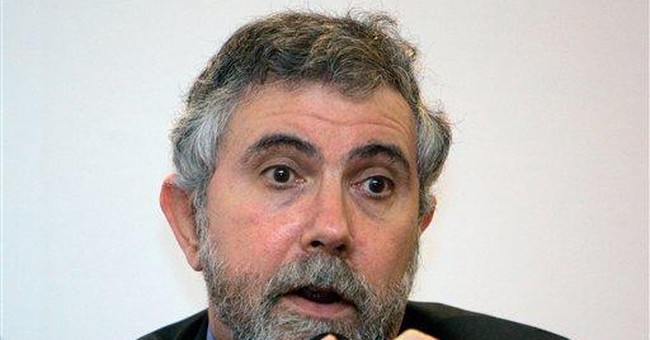How Liberals Defend Theft
How Liberals Defend Theft

Imagine two thieves about to rob a bank. Before they consummate the act, they discuss the ethics of what they are about to do. Is there some moral argument in favor of it? Is there a case against it?
It’s hard to imagine such a conversation. Then again, there aren’t very many bank robbers around these days.
There are, however, millions of people who believe in a different kind of theft. They think it’s OK for the government to steal your money and mine for their benefit. They think that’s more than OK. They refuse to vote for politicians who don’t promise thievery on a massive scale.
Where would we find a justification for doing what the Bible clearly says is wrong?
You won’t find it at progressive campaign rallies, which are beginning to resemble gladiatorial arenas in ancient Rome. I can just picture Emperor Sanders yelling to the crowd, “Should we spare the billionaire?” “No,” roar the toga-clad listeners, who in unison point their thumbs down.
But far away from the rabble rousers, is there a reasoned defense of what risks becoming a modern-day Hobbesian jungle?
For defending the indefensible, I find that New York Times columnist Paul Krugman can usually be counted on. The other day, he rose to the task and didn’t disappoint. I read Krugman to say there are five reasons why we should rob the rich.
They were just lucky. Wealth creation is often like a casino in Krugman’s view. Most people lose the money. But once in a while someone pulls the right slot machine lever and voilà! He’s got a bundle. But does he really deserve it?
When I look around the world at rich people, though, I don’t notice a lot of luck. Bill Gates built Microsoft. Steve Jobs built Apple. Sam Walton built Wal-Mart. Ross Perot built EDS. I could go on.
I suspect that all these people worked round the clock – at nights and on weekends – to achieve what they achieved; and they worked much harder than just about anyone you know.
The only gamble involved was taking the risk that they could meet our needs. And remember, if they don’t meet our needs they don’t get a dime. Luck doesn’t make people rich. You and I make people rich when we buy their products.
They probably stole it. Krugman dismisses fortunes in high tech by suggesting they “are modern versions of the monopoly spoils grabbed by old-fashioned robber barons.”
Hmmm. Last time I looked, Bill Gates wasn’t forcing anyone to use Microsoft Word. Jeff Bezos isn’t forcing me to buy from Amazon. Peter Thiel doesn’t point a gun at my head and demand that I use PayPal. Mark Zuckerman isn’t demanding that I use Facebook.
If these products have come to dominate their markets, it’s because they meet our needs better than any rivals do.
They aren’t real people. Krugman was once asked why it’s OK to take money away from LeBron James. He replied that he doesn’t like to talk about specific individuals. Of course not. Once the victim has a name, he or she becomes a real person. Did LeBron James ever do anything to harm you? Did he borrow money from you and refuse to pay it back? Did he steal from you? No? Then why do you want to rob him of money he rightfully earned?
Many successful people in professional sports and in the entertainment world started out in life with virtually nothing. They worked hard and deserve what they have. These people would have no income at all unless you and I are willing to pay to see them perform.
Rags-to-riches stories are common among the very rich. J. K. Rowling (author of the Harry Potter books) appears to be the richest woman in the world. She started out on welfare.
The rich should be treated like slaves. Most readers of this column probably know nothing about the economics of slavery. But economists have studied the subject a lot. You have to spend a lot of money on slaves in order for them to be productive. You have to feed them, house them, clothe them and tend to their medical needs.
How does the slave owner maximize his profit? Economists tell us he will exploit his slaves until the last dollar spent on their upkeep is equal to the last dollar of income their work produces.
Hard to believe, but this is exactly what Paul Krugman would like to do to rich people – at least as far as the tax system is concerned.
What tax rate should rich people pay? According to Krugman it should be the rate that maximizes what they fork over for the rest of us. If the tax rate were 100%, the rich wouldn’t work at all. So, Krugman acknowledges you have to give them some of what they produce. He guesses the ideal rate is 90%.
In order for a highly successful person to earn a dime, he would have to produce 90 cents for everybody else.
They shouldn’t even exist. Krugman at times suggests that rich people could be a cash cow for the rest of us. At other times, he seems to agree with Bernie Sanders: we would be better off if they didn’t exist at all. Elizabeth Warren’s own economic advisors say that if her wealth tax had been in effect starting in 1982, Bill Gates, Michael Bloomberg and Warren Buffett would have lost most of their fortunes by now.
I suppose things could be worse. Prometheus, who made civilization possible by capturing fire, was chained to a stone and eaten by vultures. But keep that to yourself. We don’t want to give the progressives any more ideas.




Post a Comment